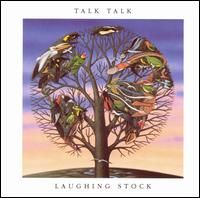
It is astounding that Laughing Stock was one of the first albums widely considered “post rock” for many reasons. First, Talk Talk was a New Wave band, and a fairly successful one at that. By their final album, the band (or what was left of it) abandoned that staple and moved to a more experimental sound. Spirit of Eden, the album preceding this one, abandoned all pop sensibility and led directly into this remarkable, influential album. But how influential was it, really? From my point of view, no one takes any ideas from Talk Talk anymore. If we took Laughing Stock out of 1991 and put it in 2007, it would probably still have the same pioneering effect, because hardly anyone managed to follow their example with any sort of success and their influence is all too veiled today. Many bands cite them as key influence, but I hear no tremolo picking, delay pedals, or long, unwavering periods of ambience, the characteristics defining today’s post rock, on Laughing Stock. Instead, this album has a subtle jazz influence, filled with lush organ tones, brilliant, articulate guitar sounds, and sensible grooves. Yes, on Laughing Stock, the drums do more than build momentum for a build at the end of a song. Most noticeably different from other post rock, however, are the vocals. Mark Hollis sings with brilliance here, only appearing when needed and making the music interesting rather than repetitive.
Maybe no one followed suit because no one understood what was going on at the time. NME gave it a 4/10 when it came out; claiming the album to be unutterably pretentious and finished by bluntly stating “It’s horrible.” In fact, the reviewer spent more time describing the remix album Talk Talk’s previous label, EMI, put out rehashing the same old singles and bashing Mark Hollis for not riding on that success. While not all reviews were this negative, most only claimed it as good and took it to be more of a jazz album, considering it was released on Verve Records. Flash to the 21st century, and we find Pitchfork Media claiming it the eleventh best album of the 1990s gleaming with a five star review from All Music Guide. Nobody realized what this album meant until years later, when we went back and noticed that this album was not horrible. In fact, it was brilliant. The ones who didn’t understand? They’e the laughing stock now.
Remarkably, there were only two band members left at the recording of the album – Mark Hollis and Tim Friese-Greene, although ex-member Lee Harris returned as a session player on drums. While Hollis and Friese-Greene wrote all the music here, many session players appear in each song. Still, there is an undeniable chemistry in each song, as if they had been playing together for years. For proof, look no further than Taphead, a masterfully subtle piece of music. Beginning with simple guitar melody and Hollis’ wavering, unsure vocals, it leaves the listener wondering where the song will go next. Unexpectedly, keyboards fade in and then the darkest, warmest trumpet sounds, one after the other, building beautiful harmony, with tension and release techniques apparent throughout the feature. With this, Talk Talk creates a climax unlike any heard before or after. Following a more frenetic trumpet feature, light drums, bass, and piano enter, setting the slightest groove to allow for a screaming trumpet note and Hollis’ vocals. Another climax that lasted less than a second. The control that the ensemble shows in Taphead is unparalleled.
However, songs like Ascension Day and New Grass work better to describe the overall sound of Laughing Stock, if there really is one. Both revolve around superb drum grooves and allow that to drive the song. With this style, the joy of listening is not to wait for the climax. The entire song is enjoyable. Instrumentally, Ascension Day sets itself up with warm keyboard and bass, while guitar with impeccable, brilliant sound remains the primary melodic instrument. Hollis sings about judgment day and its inevitable coming, saying farewell to us all. The highlight of the song comes at the end, when Hollis’ guitar gets more intense and the band follows him. Once again, a climax, but there was no need to slide up on the fretboard, turn on the delay pedal, and pick away. In fact, he plays the same notes he played the whole time. New Grass is more celebratory in its music and in its lyrics, dealing with finding Christianity. The splashy drum groove remains solid as a rock, hardly changing. Pianos, keyboards, and organs make a more noted appearance here than anywhere else, their tone helping the atmosphere of the song. In any light, each song on Laughing Stock is brilliant.
If post rock artists want to save their genre from dying out from repetition and lacking originality, they need to turn to their roots. Talk Talk provides an entirely different route for these bands to follow. They show that post rock does not have to be so moody, and an album does not have to be one style and atmosphere. Some songs are celebratory; some are lamenting. There is a song for every day, every feeling. Two days ago, I identified more with After the Flood. Yesterday it was Ascension Day. Today I find myself continuously returning to Taphead. The world needs to hear this album, even if you haven’t liked post rock before, because I guarantee that this is not the type of music you think of when you think post rock. Unfortunately, it should be.
Tracklist:
1. Myrrhman – 5:33
2. Ascension Day – 6:00
3. After The Flood – 9:39
4. Taphead – 7:39
5. New Grass – 9:40
6. Runeii – 4:58
